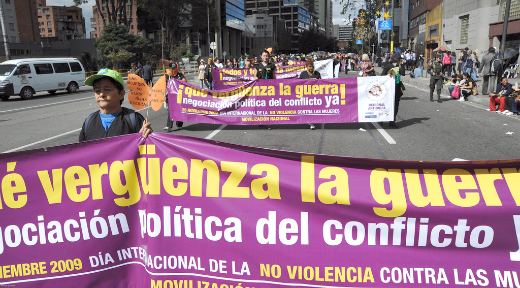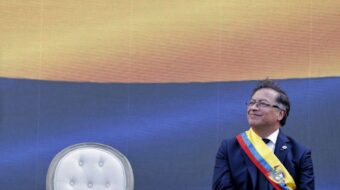
Over three days in late October, family members of those killed and survivors of government persecution paid homage to Colombia’s Patriotic Union (UP, for its Spanish-language initials). They memorialized victims of slaughter of UP activists, which, after nearly a quarter century, is still ongoing.
A peace plan forged by the government of President Belisario Betancur and the FARC, or Revolutionary Armed Forces of Colombia, gave rise to the Patriotic Union, formed in 1985 as an electoral coalition. Most of the candidates for public offices at every governmental level belonged to the FARC or the Colombian Communist Party. The possibility loomed that guerrillas would give up arms for peaceful democratic struggle.
But massacre at the hands of state security forces and right-wing paramilitaries began immediately. Since 1986, almost 5,000 UP activists – including elected officials, candidates, union leaders, human rights activists and two UP presidential candidates – have been killed. Impunity has been the rule.
Carlos Lozano, editor of the Colombian Communist Party newspaper Voz and CCP Executive Committee member, spoke at one of the commemorative gatherings, recalling especially UP presidential candidate Jaime Pardo Leal. Murdered on October 11, 1987, Pardo Leal was, according to Lozano, an “outstanding jurist and revolutionary fighter [and] Communist Party militant.” He was “dedicated to establishing a left alternative and a social and political transformation.”
October 11 has become the “National Day for Dignity of Victims of Genocide against the Patriotic Union.”
Lozano tied the government of current President Juan Manuel Santos to that of predecessor Alvaro Uribe. Both regimes represent the “same exploitative capitalism accompanied by violence from the heights of power – aimed at silencing opponents and critics.”
He recognized the left coalition Alternative Democratic Pole as continuing the UP mission, that of peacefully shaping a future of hope, basic change and justice. Having himself recently run for Congress for the Pole, Lozano sees that party as “a bastion of anti-imperialist struggle, breaking ties with imperialism, and maintaining anti-oligarchic struggle to achieve profound political, economic and social changes.”
But, he cautions, “These aren’t achieved through ways of conciliation, through political weakness and ingratiating oneself with the establishment or by accepting hand-outs to receive crumbs.” Lozano insisted upon political independence for working people’s political mobilization.
Survivors of the UP killings still face persecution, jail, disappearances and torture. And, according to one organizer of the commemoration events, “Genocide against the Patriotic Union continues, especially [against] members of the Communist Party that are part of the UP,” she said.
A prison letter from UP survivor David Ravelo Crespo, distributed last month via the Internet, testified to one survivor’s subsequent political work and continuing persecution.
In his letter, Ravelo, a CCP Central Committee member, recounts his jailing on September 14 in Barrancabermeja, an oil-producing city in Colombia’s north. Authorities later transferred him to a Bogota prison under anti-terrorism laws. A jailed paramilitary capo had fingered Ravelo as the “intellectual author” of a murder 19 years ago. Family members had previously received multiple death threats.
Ravelo sees himself as “a prisoner of conscience for thinking and believing differently from the establishment.” His life has been “dedicated to the struggle against inequality and social disparities. To build a homeland where children do cry, but out of happiness, is why we struggle.”
He recounts struggle as a student activist, library worker, university teacher and leader since 1993 of the CREDHOS human rights group. He served as a housing official, regional assembly delegate and city council member, all under the UP banner. Ravelo helped organize strikes in response to killings of the UP activists. He was imprisoned without charge for 27 months in 1992.
Media allegations recently circulated that Ravelo was a leader of the FARC, but he blamed them on his having distributed a video showing former President Uribe conferring with right-wing paramilitary leaders.
Ravelo recently led protests against government plans to privatize Ferticol Fertilizer Company located in Barrancabermeja. The state-owned enterprise is “a source of life for this region,” he said in one article.
At the root of his persecution, claims Ravelo, is a campaign directed at “weakening the popular movement and especially human rights organizations.” He promises to “continue firm in my principles,” adding that, “The stem of truth may bend, but never breaks.”
Image: Women carry signs demanding negotiations to end violence and terrorism in Colombia. Luis Gomez // CC BY-ND 2.0












Comments